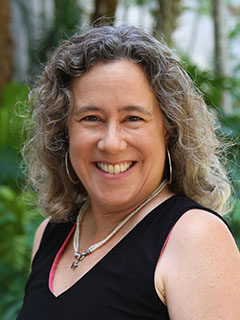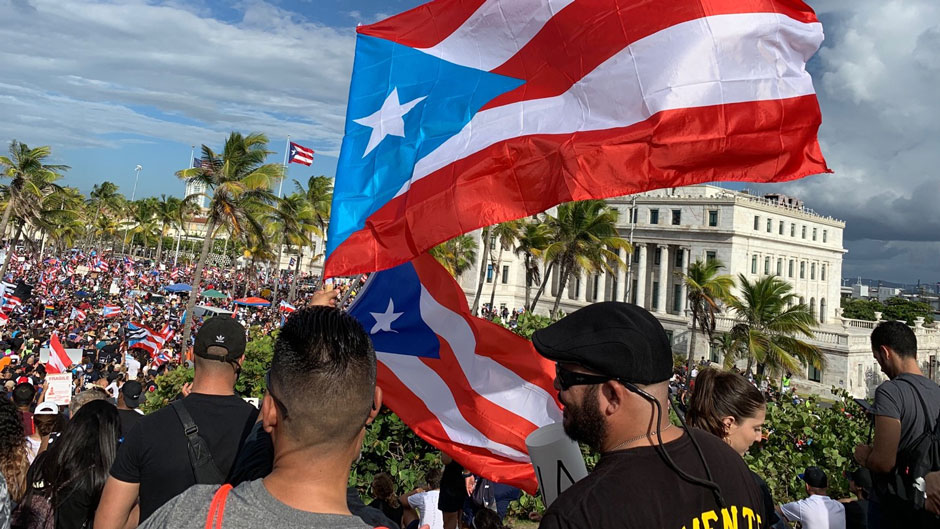Since July 10, more than a million Puerto Ricans living on the island and around the world have taken to the streets to demand the resignation of the governor of Puerto Rico, Ricardo Rosselló. The unprecedented scale of the protests has startled Puerto Ricans themselves. But perhaps the question is not why Puerto Ricans are on the street but why it took so long for the uprising.
To start, the island has been undergoing an economic recession since 2006, when the U.S. Congress eliminated section 936, that gave tax credits to U.S. companies (especially pharmaceutical companies) to base operations in Puerto Rico. In March 2009, Public Law 7 was passed under Luis Fortuño’s government and severe austerity measures began to be put into effect. The government laid off 30,000 government workers, and public pension and retirement systems were privatized. Soon after, the island’s government severely defunded public education with disastrous consequences for the public school system and the University of Puerto Rico.
As U.S. companies moved out of the island to outsource their operations to cheaper (international) locations, Puerto Rico’s government debt kept growing because its bonds were extremely attractive to U.S. financial corporations. Unlike in any of the 50 states, Puerto Rico’s bonds are triply tax exempt (local, state and federal). Moreover, as mandated by Puerto Rico’s constitution, the government is required to pay back the debt even before they cover expenses related to local public needs. The winners in this deal were U.S. companies and vulture funds who knew that although the government would become insolvent, it had to pay them.

Nearly ten years later, in 2015, Puerto Rico’s economy officially collapsed, when the then governor of Puerto Rico, Alejandro García Padilla, declared that the island’s debt of $72 billion was unpayable.
The U.S. Congress responded by passing a bipartisan federal law: the Puerto Rico Oversight Management and Economic Stability Act (PROMESA). This law created a fiscal oversight and management board (FOMB) that is known locally as la junta, a body not elected or supported by Puerto Ricans, but that is empowered to decide how the island shall manage its economic crisis. To date, the board’s main objective has been to assure that Puerto Rico’s government pays no matter what the social cost.
In 2016 Puerto Rico’s government tried to declare bankruptcy and re-structure the debt (as other states of the U.S. federation are entitled to do). The Supreme Court, however, struck down this option, by reaffirming that since 1984 the island is not considered a state under the Bankruptcy Code (Commonwealth of Puerto Rico et al. v. Franklin California Trust et al., Supreme Court, argued 22 March 2016 and decided 13 June 2016). And with the passing of PROMESA, this decision reiterated the colonial status of the island as an “unincorporated territory” and strengthened the control of the Junta de Control Fiscal over the economic future of the island.
In addition to the debt and austerity crisis, Puerto Ricans have responded in multiple ways. Thousands of Puerto Ricans have migrated to the U.S. in search of better economic conditions. Students from the University of Puerto Rico declared a system wide strike in 2017, and created a broad coalition of groups who called for the auditing of the debt and the University’s books. Yet, the many local claims for an audit of the debt to find the real people and organizations responsible have fallen on deaf ears. Meanwhile, many U.S. investors moved to the island to benefit from tax breaks not available to Puerto Ricans.
This was the situation when in September 2017 hurricanes Irma and María hit the island and destroyed the power grid and the collapsed the basic infrastructure of a country undergoing an economic crisis for nearly 10 years. Many people did not have electricity for a year; many houses and neighborhood were destroyed. Assistance from FEMA and the U.S. Congress was slow and much less than the emergency support offered in Louisiana and Texas after hurricanes Katrina and Harvey.
Rosselló’s government also stepped up austerity measures. In another chapter of what Naomi Klein denominates as disaster capitalism, U.S. capital directly benefited from neoliberal policies. As a result, the economic crisis of the island worsened, many public schools were closed, and the University of Puerto Rico’s budget was severely reduced. An even greater number of Puerto Ricans left the island in search of homes, employment, and safety. The slow and neglectful response by Puerto Rico and the federal government also directly contributed to a high death toll, touching most of the population. In May 2018, a Harvard study revealed that 4,645 Puerto Ricans died during or as a direct result of hurricane María. The official death toll according to Roselló’s administration was 64.
In the middle of this enormous crisis, many began to notice that the current government was not responding to people’s needs. Scandals of money mismanagement and shady contracts abounded. In response, many began to engage in autogestión or self-governance to find alternatives to the current crisis without expecting or searching for state support. Groups like Colectiva Feminista en Construcción (https://www.facebook.com/Colectiva.Feminista.PR/), Casa Pueblo (http://casapueblo.org) and Movimiento de Victoria Ciudadana (https://twitter.com/victoriaporpr?lang=fr), to name just a few among the many existing organizations are asking for substantial changes in how politics are conducted in the island. Valor y Cambio (https://www.valorycambio.org), an art and just economy project by Frances Negrón-Muntaner, introduced a community currency to provide a platform to discuss the notion of value and practice a just economy based on exchange and solidarity rather than extraction and profit.
One of the main accomplishments of these interventions is the call to end government corruption, the demand accessible education, and respect for all people.
Fast forward to 2019. On July 10, Puerto Rico’s former secretary of education, Julia Keleher, former Puerto Rico health insurance administration head, Ángela Ávila-Marrero, businessman Fernando Scherrer-Caillet, and education contractors Glenda E. Ponce-Mendoza and Mayra Ponce-Mendoza, were indicted by the FBI for money laundering, fraud, and other charges. The organization Unidos por Puerto Rico, headed by Beatrice Rosello (Puerto Rico’s first lady) was also accused of mismanagement of funds received from private donors to assist Puerto Ricans after the hurricane.
Then, on July 13, the Centro de Periodismo Investigativo released a chat of 889 pages, created and administered by the governor of Puerto Rico, Ricardo Roselló, in which the worst suspicions and many more were confirmed. The governor, with a group of 11 men, some part of his cabinet, and others simply close friends, discussed their shenanigans to manipulate how their administration was depicted in the news, made jokes at the dead during and after hurricane María, as well as sexist, homophobic, and misogynistic jokes about other politicians, artists and public figures. To many, the chat showed that the governor and his close allies did not really care about the current crisis or the future of the island.
For many, this was the last straw. The government was not only corrupt and neglectful, they were laughing at their loss and denigrating who they were. People from different political sectors, artists, politicians, Puerto Ricans from the island and the diaspora, united in one claim: “Ricky, renuncia.” Many also added: “Ricky, renuncia, y llévate la junta,” linking his departure with a need to dismantle the control board. Artists like Bad Bunny, René Pérez, and Ricky Martin, joined grassroots organizations, social media influencer El Rey Charlie and a crew of motorcyclists, as well as individual citizens from different political affiliations to go to Fortaleza in Old San Juan and demand the governor’s resignation.
On July 17, half a million people gathered in the capitol and walked to Fortaleza to protest. Since then, Puerto Ricans have gathered every night outside the governor’s mansion to protest. Many other protests have followed and are taking place in other towns in the island, in several cities in the U.S., and even in several European countries. Perhaps Ricky Martin, who was personally the target of homophobic jokes in the governor’s chat, put it best when in a video post on his Twitter account on July 16, he said: “The Puerto Rican community has suffered enough.”
Yet at a moment of crisis, Puerto Ricans are finding the power of their unity as a source of change. There is a long road ahead of Puerto Rico but one thing has become clear: Puerto Ricans are tired of suffering, but they are not tired of being Puerto Ricans, and that renewed sense of being is animating all of us for the long road yet to come.
Puerto Rico is no longer rising… Puerto Rico se levantó.
Yolanda Martínez San Miguel is Professor and Chair of the Department of Modern Languages and Literatures, and currently holds the Marta S. Weeks Chair in Latin American Studies at the University of Miami College of Arts and Sciences. She is an expert in Caribbean and Latin American colonial and postcolonial cultural studies.

